
The future might just be brighter for little girls like this (not Cosby kids, cause this is a cute Cosby kid, but real girls this age) than the reality was for girls her age even ten years ago.
I got an interesting comment from @scalextrix on my post of two days ago which got me diving deeper into one of the 14 charts that the World Bank published in their Year in Review. @scalextrix hit the nail on the head with this comment:
There is a strong correlation between womens rights (or lack thereof) and poverty.
There has to be a World Bank analysis backing this up, right?
The World Bank review report had one item dealing with gender equality which can be summed up as "in economies with less legal gender equality, fewer women work and fewer women own businesses." Okay, but I wanted a deeper dive to be able to respond more substantively to @scalextrix's comment. The report gave a link to another report (one cannot fault the World Bank for producing too few reports) by Women, Business and the Law which describes its activities as "measur[ing] gender inequality in the law. The dataset identifies barriers to women's economic participation and encourages the reform of discriminatory laws."
I took the plunge and read the key takeaways.
So the comment was about women's rights and poverty. Over the years I've seen enough studies correlating lack of access to education for girls, early marriage and pregnancy to generational poverty, but this report takes a different and intriguing tack.
My first stop was on the cover image. It sums up women's experience so well...regardless of where "out of the maze" is. To wherever. It's much more circuitous for women.
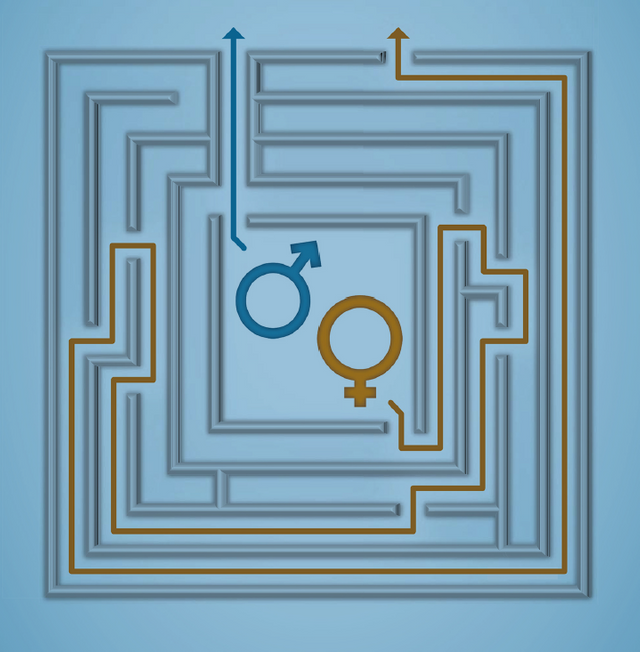
The headline of the report is "Globally, over 2.7 billion women are legally restricted from having the same choice of jobs as men." Ummm...that's out of 3.73 billion globally in 2017, which frankly says we still have a long way to go.
A global look at where things have improved most for women
Women, Business and the Law looked at masses of indicators globally to see where the most improvements had been made legislatively for women over the last two years.
Women, Business and the Law captured 87 changes toward legal gender equality across 65 economies, among the scored questions, over the last two years. Of the five economies implementing the most reforms, four are in Sub-Saharan Africa: the Democratic Republic of Congo, Kenya, Tanzania and Zambia. One, Iraq, is in the Middle East and North Africa.
Emphasis mine. Surprised yet? No? Read on.
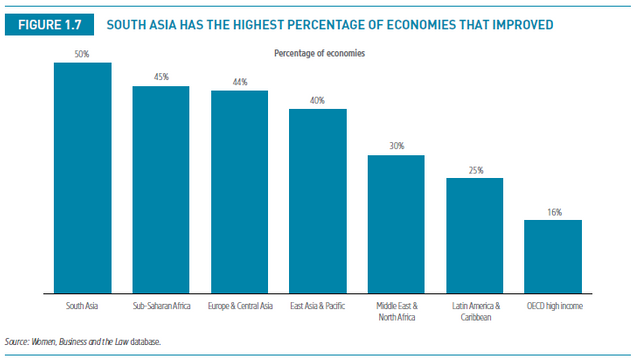
Sub-Saharan Africa came second in terms of legislative improvements. Okay, I'm listening now, I thought.
What about specific improvements?
That's where Sub-Saharan Africa starts to flag in the race, particularly when it comes to measures facilitating women building credit (how else are you going to run a business of your own?) and on protecting women from violence.
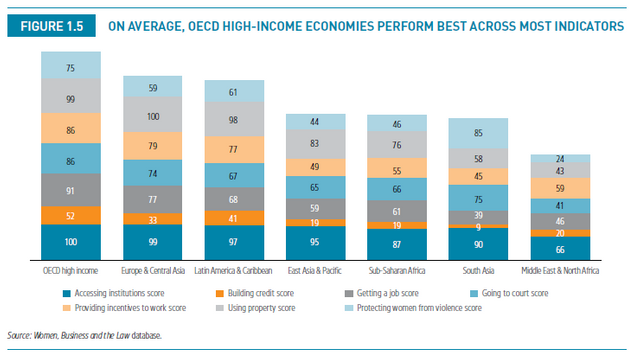
There are also systemic restrictions on women accessing work.
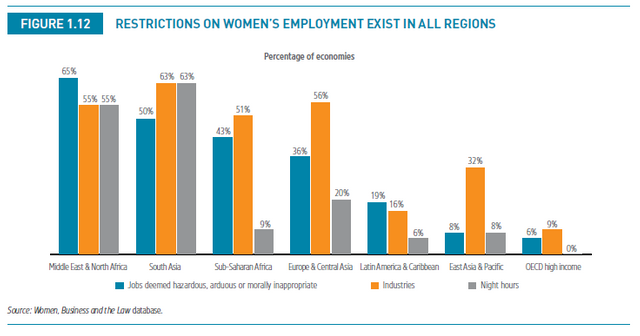
Is it all doom and gloom? What about the happy little girl?
Check out this map showing where an anti-discrimination commission is legislated and tell me you're not just the teeniest bit surprised. Nineteen countries in Africa (I couldn't tell from this graphic whether Lesotho was orange or blue, so didn't count it), including South Africa, have legislated anti-discrimination commissions.
The report had this to say about Zambia, the country I invest much of my time for business:
Zambia’s Gender Equity and Equality Act now prohibits gender discrimination in various aspects of employment and
mandates equal remuneration for work of equal value. Zambia also established the Gender Equality Commission and
prohibits discrimination based on gender and marital status in access to credit. Finally, Zambia established civil remedies for sexual harassment in employment.
And yes, South Africa is also a "blue" country.
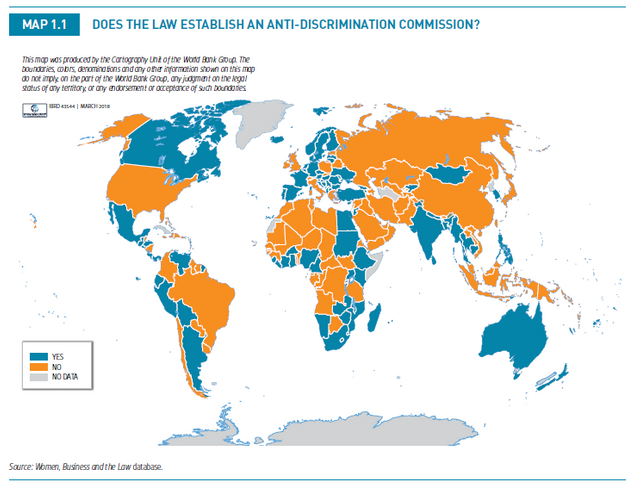
Women and property rights
Ah, this is an interesting indicator as it's really a "where the rubber hits the road" tell about women's ability to control their own destinies and lead their families to higher quality of life and better opportunities - by owning a business, or at least having a leadership role in a business. The report correlates property rights to women having access to holding leadership positions in business.
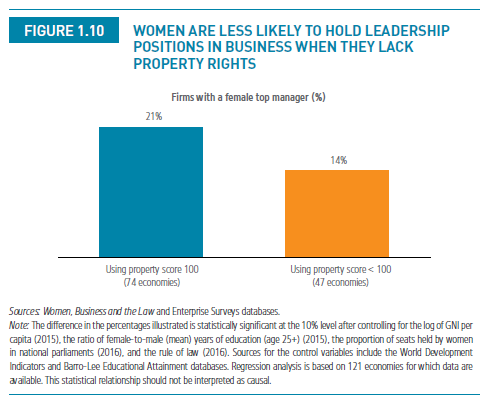
In conclusion?
We have a long way to go, but the report's "future vision" graphic leaves me with a bit of a bitter taste.
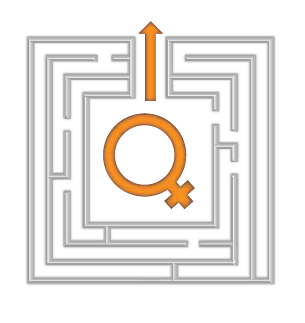
Where are the men in this image? We need to walk this path together.
All images taken from Women, Business and the Law 2018
References
World Bank - Year in Review: 2018 in 14 Charts
Women, Business and the Law 2018

Team South Africa banner designed by @bearone
Found you on weku! Followed you. I am @yvette on weku. Are you on whaleshares?? :)
Downvoting a post can decrease pending rewards and make it less visible. Common reasons:
Submit
Hi @giantbear aka @yvette - nice to see you, and wishing you a gloriously happily 2019! No, I'm not on whaleshares. Do you recommend it?
Downvoting a post can decrease pending rewards and make it less visible. Common reasons:
Submit
Nice research @kiligirl, and glad I could provide some of the spark :)
Interesting to see the UK as orange in the anti-discrimination commission chart, we do have anti-descrimination laws though, at least to some extent we arent cave-men!
I especially agree with your final comment, equality is about all genders working together, not just "turning the tables" on the status quo, or focussing on the rights of women above all else.
Downvoting a post can decrease pending rewards and make it less visible. Common reasons:
Submit
Hi @scalextrix, you really did inspire me to dig deeper (hey, it's the holidays, nobody's reading Steemit and I could have phoned it in).
And yes, equality is about all of us working together. I'm a woman engineer working in a man's world and what I've seen over the last 30 years is the best champions of women in engineering are men in engineering. Women are good too, but men with the power to make a difference see the benefits and fight for the change.
I was also surprised to see the UK as orange. Need to read the report in detail to understand that.
Thanks for your terrific words of support - they mean a lot.
Downvoting a post can decrease pending rewards and make it less visible. Common reasons:
Submit
Its what I believe so no need for thanks, but I appreciate the sentiment. Glad you have had good support from colleagues, to me its all about merit, if you are the best person for the job, then you should have it.
I saw that they are making a TV sequel to the film Das Boot, they are trying to wedge in some female characters back on dry land, which seems a bit weird to be honest. If we want a film about the desparation of war, we already have Das Boot, if we want a film about womens role in war, lets make a film about that, not wedge them in as a quota. Maybe it will be alright, but it seems a little odd to me: https://www.dw.com/en/19378609/a-46426262
Downvoting a post can decrease pending rewards and make it less visible. Common reasons:
Submit
I agree with you, @scalextrix. I liked how the British Legion incorporated women into their poppy campaign this year - they selected individual women who served and lost their lives in WW1 and shared their names and a few details about them as part of a poppy jewellery offering. I bought one of those special edition brooches and ended up researching the young woman's life story. This was a real person who gave real service and nobody had to invent her role in a submarine.
Downvoting a post can decrease pending rewards and make it less visible. Common reasons:
Submit
Oh, and by the way, the good support I had was balanced out by idiots and jealous jerks who did everything they could to block my way. Was a good reminder to always be better than everyone else around me.
Downvoting a post can decrease pending rewards and make it less visible. Common reasons:
Submit